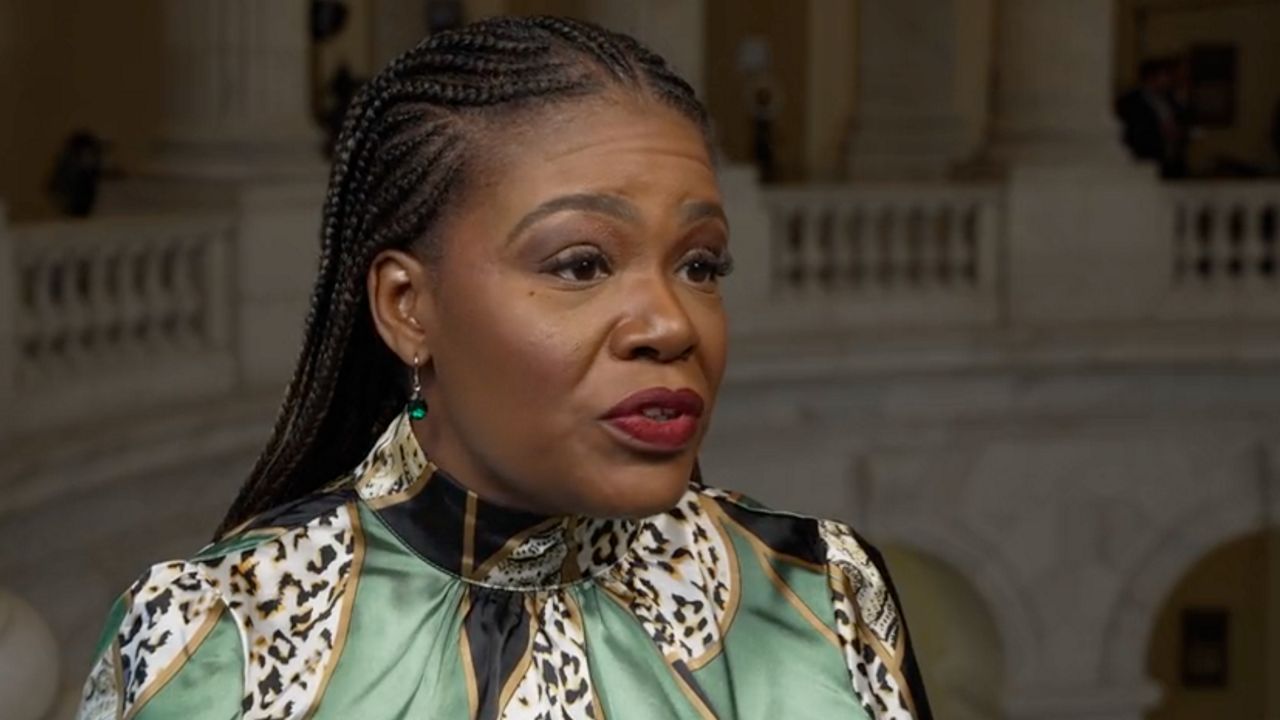ST. LOUIS—Rep. Cori Bush’s downtown St. Louis office closes Friday as her time representing Missouri’s first district is technically down to less than two weeks. Lawmakers are expected to adjourn for the session as soon as they pass a bill to extend federal government funding.
Bush’s Capitol Hill office closed last month as she winds down the end of her two-term tenure following her defeat in a bitter primary against St. Louis County Prosecuting Attorney Wesley Bell.
She delivered a “farewell address” on the House floor last week, and this week met with Spectrum News for an exit interview where she reflected on her defeat, the transition and her future.
In 2021, Bush voted against the Bipartisan Infrastructure bill, a $1.2 trillion measure that passed without her support. She voted against it because other aspects of the Biden administration’s “Build Back Better” agenda were stripped out. She coasted to re-election in 2022. But in 2023 and 2024, the vote became an anvil.
When Hamas launched terror attacks on Israel in October 2023, Bush, a critic of the Israeli government’s policies in Gaza called for an immediate ceasefire after the Israeli military responded. She also stepped up critiques of the U.S. government’s military support for Israel.
By the end of October, Bell dropped his U.S. Senate bid and launched a primary challenge. Pro-Israel groups poured millions into the race, making it the second most expensive House primary ever. Bush insists the advertising campaign backed by AIPAC and others that led to her defeat was full of misinformation, using her vote on infrastructure as cover.
“If the people of St. Louis really knew what happened with that vote, really understood that that vote was for the full economic agenda, that I did exactly what President Biden asked of me directly, then I think there would have been a different result there,” she said. “If you believe in what you believe, if what you’re saying is right, you should be able to speak to it,” she said of the ad blitz that rarely, if ever referred to her views on the Middle East.
That sparked Bush’s primary night speech where she pledged to tear AIPAC’s “kingdom down”. She said she would continue to advocate for an end to Citizens United, the Supreme Court ruling that led to a flood of unlimited money into political campaigns.
“The people who are going to be represented should be the ones who have the loudest voice in who that elected official will be and that’s not what happened in our district. In our district, Republicans made the decision about who was going to be the Democratic congressperson and so that’s the first thing that we have to tackle,” she said.
That’s unlikely to change in the near term, with a 6-3 Supreme Court favoring conservatives and an incoming Republican administration bolstered by a GOP-controlled Senate confirmation process.
Bush kept a relatively low profile after losing to Bell in the August primary. The two never spoke on election night and haven’t spoken since. In an interview this week she referred to him as her opponent and successor.
The matter of who, if anyone, is supposed to break the ice, is still up for debate.
Bush points to when she defeated Rep. Lacy Clay in 2020, and reached out to him. Despite their differences, Clay showed her around and their staffs met. She says there’s been no transition discussion.
“I have not had any outreach from my successor, she said. “I want him to look at ‘how best do I serve St. Louis’ and the best way to serve St. Louis would be to find out something from the person who’s been doing it for the last four years,” she said.
Bell’s team says there have been transition discussions at the staff level, initiated by them.
“It is unclear to me what sort of additional conversations the outgoing Congresswoman is hoping to have. Given the fact she never called the Congressman-Elect to concede the race, congratulate him, or offer any form of support, it seems to me the onus is on her,” Jordan Blase, a Bell transition aide told Spectrum News.
The first congressional district will still be represented by a Democrat, but after this cycle, the “progressive” ranks are getting smaller and smaller in Missouri. Republicans swept statewide offices again, held their congressional seats and retained supermajorities in the General Assembly. But progressive policies continue to find majorities at the ballot box.
Bush said she hears many of the same concerns wherever she goes, whether it’s rural out-state Missouri or the urban-suburban centers. Progressives have to overcome misinformation over what they’re about, she said.
“Progressives get to be the boogey man and we hear ‘Oh well they want to make it so anyone can come into the country and this hurts people but that’s not true. What we’re saying is give dignity, humanity to every person and it starts with those that have the greatest need and sometimes those people are often in our rural communities,” she said.
What’s next
She does have concerns about what a second Trump administration and GOP control of Congress will mean for the St. Louis region when it comes to issues like the U.S. Postal Service, or MetroLink’s Green Line expansion. She also wonders about what will happen with the EPA, the U.S. Army Corps of Engineers and the Department of Energy on issues related to nuclear contamination in the region.
She struck up an unlikely alliance with Republican Sen. Josh Hawley on the issue of radiation exposure over the past two years. Despite their disagreements on other issues, Hawley had praise for Bush’s work trying to pass the House version of his Senate bill, the Radiation Exposure Compensation Act, which would pay people with ties to more than 20 St. Louis area ZIP codes who have medical issues because of nuclear radiation.
“Cori has been a very vocal advocate in the house for victims of nuclear radiation in St. Louis, in St. Charles, which isn’t even her district and frankly across the country and I’ve really appreciated her work on that,” Hawley said. Both Hawley and Republican Sen. Eric Schmitt said they’ve raised the issues related to nuclear radiation with Trump’s cabinet nominees, with Hawley telling Spectrum News that Robert F. Kennedy, Jr., Trump’s pick for Health and Human Services Secretary, is on board as an ally for a new push in the next Congress to pass RECA. Hawley has pressed the federal government for a faster cleanup of the Coldwater Creek region.
In Bush’s farewell speech, she said “While my time in Congress may be coming to an end for now, for now…. know this, I came into congress with my voice. Congress did not give that to me. Congress can not take that away when I leave.”
She said “a lot is on the table” as far as her next steps, which will include spending time with family but also staying focused on the issues she’s championed before and during her tenure in Congress, like reproductive rights and increasing the minimum wage. She kept the door ajar for a potential run to get her seat back but also left space for running for something else if it’s the right fit for the moment.
“I’m not going away,” she said Wednesday. “They can’t take away the title, I’ll always be the Honorable Congresswoman Cori Bush but whether you’re an actual Congressperson or not, I’ll always love you and take care of you,” she said.



